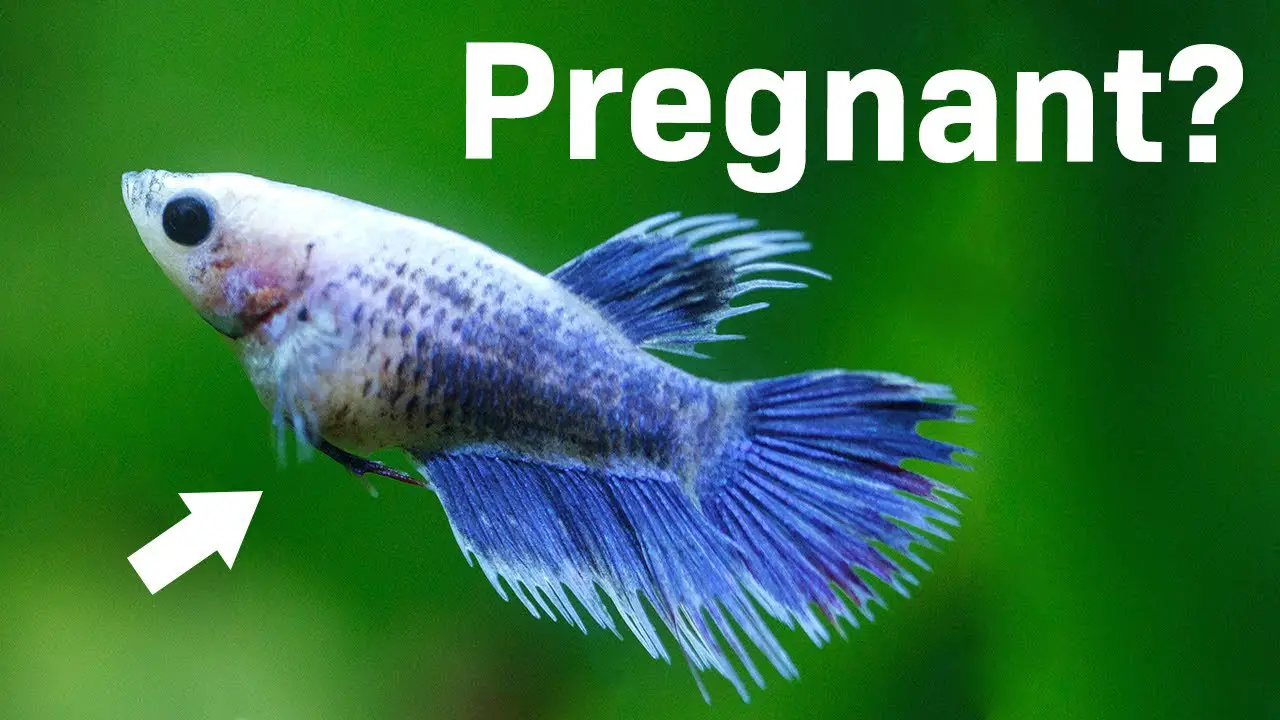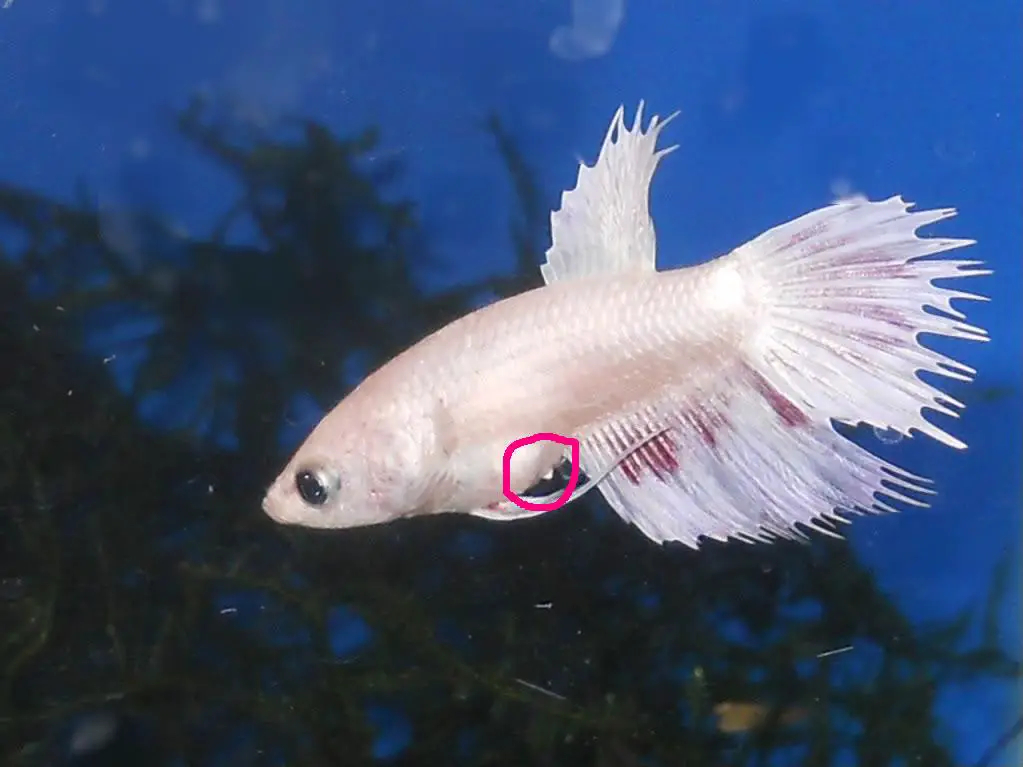Originally posted on May 11, 2023 @ 11:00 am
Last Updated on 7 months by admin
Are you curious about the mysterious world of betta fish reproduction? If so, you’re not alone! Understanding how betta fish get pregnant can be a fascinating and rewarding experience for fish enthusiasts of all levels.
Unlike some other species of fish, bettas have a unique way of reproducing that involves a complex courtship ritual and the creation of a bubble nest. In this article, we’ll explore the intricacies of betta fish pregnancy, including how to identify a pregnant female and what to expect during the breeding process. So, let’s dive in and discover the secrets of these beautiful and captivating creatures!
Betta fish are egg layers, and the female fish can lay up to 150 eggs inside a bubble nest created by the male betta. The male fish then fertilizes the eggs, and he will guard the nest until the fry hatch. Betta fish breeding requires a lot of preparation, and proper care of the fry is necessary for their survival. A healthy diet, clean water, and a suitable breeding environment are crucial for successful breeding.

How Do Betta Fish Get Pregnant?
Betta fish, also known as Siamese fighting fish, are beautiful and fascinating creatures. They are popular aquarium fish, known for their vivid colors and aggressive behavior. If you want to breed betta fish, it’s important to understand how they reproduce. In this article, we’ll explore the process of betta fish pregnancy and what you need to know to successfully breed them.
Reproductive Anatomy of Betta Fish
Betta fish are oviparous, which means they lay eggs to reproduce. Males and females have different reproductive organs, and it’s easy to tell them apart. The male has a long, pointed anal fin called a gonopodium, while the female has a shorter, rounder anal fin.
During mating, the male will wrap his body around the female, and the female will release her eggs. The male will then fertilize the eggs with his sperm. After fertilization, the eggs will stick to the surface of the tank or any available surface.
Preparing for Breeding Betta Fish
Before breeding betta fish, it’s important to prepare both the male and female. The first step is to condition them with a high protein diet. The male and female should be kept in separate tanks, but within sight of each other. This will help them get used to each other’s presence.
The water temperature should be kept between 78-80 degrees Fahrenheit, and the pH level should be between 6.5-7.5. It’s also important to keep the tank clean and well-maintained to prevent the growth of harmful bacteria.
Mating Betta Fish
When the male is ready to mate, he will begin to build a nest using bubbles and plants. The female will then be introduced to the male’s tank. The male will begin to court the female by flaring his fins and displaying his bright colors.
Once the female is ready to mate, she will release her eggs, and the male will fertilize them. The male will then scoop up the eggs and place them in the bubble nest. After mating, the female should be removed from the tank to prevent the male from attacking her.
Caring for Betta Fish Eggs
After the eggs are laid, it’s important to keep the tank clean and well-maintained. The male will care for the eggs by keeping them in the bubble nest and fanning them with his fins to ensure proper water flow. The eggs will hatch after 24-48 hours, and the fry will remain in the nest for another 2-3 days.
During this time, it’s important to keep the tank clean and well-maintained to prevent the growth of harmful bacteria. The fry should be fed with a high protein diet, such as baby brine shrimp or crushed flakes.
Raising Betta Fish Fry
Once the fry have hatched and left the bubble nest, they should be removed from the tank and placed in a separate tank. The tank should be small and shallow to prevent the fry from swimming too far and getting lost.
The fry should be fed several small meals throughout the day, with frequent water changes to keep the tank clean. As they grow, they can be transitioned to larger tanks and a more varied diet.
Benefits of Breeding Betta Fish
Breeding betta fish can be a rewarding and profitable hobby. It allows you to create unique and beautiful fish that can be sold or traded with other enthusiasts. Breeding also helps to preserve the genetic diversity of the species and can help to prevent extinction.
Conclusion
Breeding betta fish can be a challenging but rewarding endeavor. It’s important to understand the reproductive anatomy of the fish, prepare them for breeding, and care for the eggs and fry. With patience and dedication, you can successfully breed betta fish and create a beautiful and thriving community of fish.
Frequently Asked Questions
Betta fish are popular pets that are known for their vibrant colors and long flowing fins. If you are a betta fish owner or planning to become one, it is essential to know how these fish reproduce. In this article, we will answer some of the most frequently asked questions about how betta fish get pregnant.
How do betta fish mate?
Betta fish are known for their aggressive nature, and the mating process is no different. The male betta fish will build a bubble nest at the surface of the water using air bubbles and saliva. He will then entice the female to come to the nest by performing a courtship dance. If the female is interested, she will approach the nest, and the male will wrap his body around hers and release his sperm.
After the mating process is complete, the male will chase the female away from the nest to protect the eggs. The male will then tend to the eggs until they hatch, which usually takes around two to three days.
How can you tell if a betta fish is pregnant?
Unlike most other fish, female betta fish do not have a swollen belly or visible signs of pregnancy. However, you can tell if your female betta fish is ready to mate by looking for vertical stripes on her body. These stripes are an indication that she is fertile and ready to mate.
Another way to tell if your betta fish is pregnant is by observing her behavior. Pregnant betta fish may become more aggressive or territorial as they prepare to lay their eggs.
How long is the gestation period for betta fish?
The gestation period for betta fish is relatively short, lasting only around two to three days. After the male fertilizes the eggs, they will hatch within 24 to 48 hours. Once the eggs have hatched, the male will continue to care for the fry until they are old enough to swim on their own.
It is essential to provide the male betta with plenty of hiding places and provide him with a high protein diet during this time. This will ensure that he has the energy he needs to care for the fry and keep them safe.
How many eggs do betta fish lay?
Female betta fish can lay anywhere from 10 to 50 eggs, depending on their size and age. It is important to note that not all of the eggs may hatch, and the survival rate of the fry can vary. It is essential to provide the fry with a healthy and safe environment to increase their chances of survival.
Additionally, it is crucial to remove any adult fish from the tank once the eggs have hatched. Adult betta fish may see the fry as food, and they could end up eating them.
How often can betta fish breed?
Betta fish can breed relatively quickly, and females can lay eggs every two to three weeks. However, it is essential to give the female betta fish time to rest between breeding cycles. Breeding too frequently can cause stress and health problems for the fish.
It is also crucial to ensure that the male betta fish has time to recover in between breeding cycles. Breeding can be a tiring and stressful process for male bettas, and it is important to give them time to rest and recover.

Betta Fish Breeding Step By Step | How To Breed Betta Fish
In conclusion, betta fish, also known as Siamese fighting fish, have a unique reproductive process. The male builds a bubble nest on the water’s surface, and the female releases eggs into it. The male then fertilizes the eggs and guards the nest until the fry hatch.
Interestingly, betta fish can reproduce without a partner, a process called parthenogenesis. However, this is rare and only occurs in certain circumstances.
Overall, understanding how betta fish reproduce is essential for their care and breeding. By providing the right conditions and environment, owners can help their betta fish successfully reproduce and raise healthy offspring.
